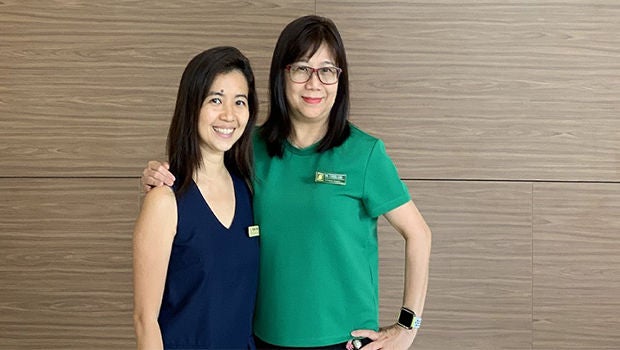
Ms Breana Cham (left) and Dr Carol Loi - two members of a small band of professional genetic counsellors who test patients for hereditary diseases and help them with psychosocial issues after diagnosis.
There are only 11 genetic counsellors in SingHealth – part of the estimated 15 in the whole of Singapore. Here, we talk to two of them.
Scenario 1:
A couple’s child has a rare genetic disorder which can lead to neurodegeneration, slow development and multiple medical issues. They did not know the condition was genetic and are severely distressed.
Scenario 2:
A young child has hundreds of pre-cancerous polyps in his colon and needs surgery to remove his entire colon. The child is too young to be aware of his condition. His parents are told it could be genetic and are devastated. They want help and more information.
In these scenarios, genetic counsellors are like detectives trying to pin down the hereditary connection.
They are the first point of contact when genetic disorders are suspected. Cases are referred to them for risk assessment and genetic testing.
After the doctor’s diagnosis, they ensure patients fully understand their condition and the available treatment options. They also offer psychosocial support, such as helping patients come to terms with their diagnosis and navigating the hospital system.
In cases where subsequent pregnancies are at risk of being affected, they discuss reproductive options with families.
A new field here
Genetic counselling is a relatively new field in Singapore although it has been around internationally since the 1970s.
In the small band serving SingHealth are Ms Breana Cham, Senior Genetic Counsellor, Genetics Service, Department of Paediatrics, KK Women’s and Children’s Hospital (KKH); and Dr Carol Loi (Phd in nursing) Genetic Counsellor, Singapore Polyposis Registry, Colorectal Department, Singapore General Hospital (SGH).
Both counsellors switched from other professions (Ms Cham from research and Dr Loi from nursing) and received their graduate training from the University of Melbourne. A master’s degree is now the standard for entry into the profession.
On the job
Both have been in the job for more than a decade. Ms Cham works with children and adults who have rare disorders. “As a subject, I always enjoyed genetics, and as a profession, it ticked off all the boxes – patient interaction, and making scientific information meaningful and relevant to individuals,” she said.
Dr Loi returned to Singapore after her training in Melbourne to work at the Singapore Polyposis Registry, Colorectal Department, SGH.
She said, “A decade ago, one of the surgeons was interested in setting up a high-risk clinic, but we needed a proper set-up, and a certified genetic counsellor, to communicate genetic risk information effectively to patients and families affected by the inherited genetic condition. I was extremely grateful and honoured to have received theTalent Development Fund Scholarship and go to the University of Melbourne for a Graduate Diploma in Genetic Counselling in 2006.”
Part of a multidisciplinary team
Genetic counsellors are an important part of a multidisciplinary team.
In SingHealth they are stationed in SGH, KKH, and the National Cancer Centre Singapore (NCCS) but they act as a resource to the various SingHealth hospitals and medical centres. For example, if a neonate is born in SGH and suspected of having a genetic condition, the team from KKH can be consulted.
Providing psychosocial help
Genetic diagnoses are often devastating. Both counsellors agree that they counsel to help patients accept living with a medical condition, but not be defined by their diagnosis.
“We help them get through it, giving them information and letting them know they are not alone. We can put them in touch with other families who have experienced, not necessarily the same condition – because some conditions can be truly isolating, like one of 10 cases in the world – but face similar challenges, so that they can find common ground,” said Ms Cham.
The support group helps
Most of Dr Loi’s patients are adults, but also include quite a number of children. “Cancer affects patients and their families in many ways. When a child is diagnosed, the whole family is distressed,” she said. Some patients need a stoma (stool bag) but others have their colon joined up and can live normal lives. “But when they grow up it may affect what jobs they can do, and they worry about marriage and having children,” she said.
“This is why we set up a support group for present and former colorectal patients and their families, so that they can support each other through sharing experiences.
“We work as a team in the group. We have survivors who never moaned but moved on, and now they return to help others. They feel great joy helping and it keeps them coming back. I’m really inspired by them,” said Dr Loi.
How to be a genetic counsellor
It takes hard and soft skills to be a genetic counsellor, said Dr Loi. “You must be interested and understand genetics, and you need the passion and emotional resources to help.”
“Since it is a helping profession, you also need the ability to communicate with people from all backgrounds. We spend a lot of time getting across what needs to be understood by families,” said Ms Cham.













 Get it on Google Play
Get it on Google Play